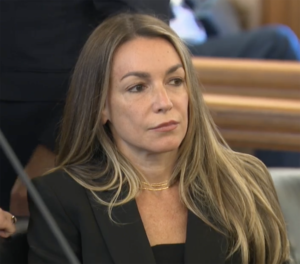Read trial postponed amid influx of federal docs
By Jay TurnerNorfolk Superior Court Judge Beverly Cannone on Monday set a new start date of April 16 for the murder trial of Karen Read, but even that might not be enough time to properly prepare after federal prosecutors turned over “voluminous” amounts of data from its own investigation into the case, according to defense Attorney Alan Jackson.
Appearing in Dedham Superior Court on Monday for what turned out to be a brief pre-trial hearing focused mainly on trial scheduling, Jackson told Judge Cannone that the five-week extension that she laid out, which includes a new March 12 date to hear defense motions to dismiss the case and to disqualify and sanction Norfolk County District Attorney Michael Morrissey, was “probably not realistic” given the massive “influx” of information they received from the U.S. Attorney’s Office just days earlier.
“We received 3,074 pages — 1.3 gigabytes of data — we’ve only had a chance to go through a smattering of that data so far,” Jackson explained to Cannone.
Of the data that they have reviewed, Jackson claimed that “all of it was brand new” and appeared to be “exculpatory,” or favorable to the defense, and that based on this information they were planning to file additional supplemental motions to support both their motions for dismissal and disqualification; additional motions seeking subpoenas for third-party records (Rule 17); and a new motion for “extraordinary governmental misconduct.”
Norfolk ADA Laura McLaughlin, however, was quick to dispute the defense team’s characterization of the recent federal data dump, noting that prosecutors have had the chance to review all of the documents and that “90 to 95 percent of the material … is consistent with the commonwealth’s theory of the case.”
“There is some new information that [defense] counsel will use in their motion and the commonwealth understands that,” McLaughlin said. “However, I would say the evidence as a whole is very consistent with prior statements made by witnesses that testified for the commonwealth.”
The theory of the case that McLaughlin referenced is that Read and Read alone is responsible for the death of her boyfriend, Boston Police Officer and Canton resident John O’Keefe, who was found battered and unconscious in the snow outside the home of fellow BPD Officer Brian Albert on Fairview Road in the early morning hours on January 29, 2022. Prosecutors believe that Read, who had driven O’Keefe to attend a party at Albert’s house following a night of bar hopping, backed over O’Keefe in her SUV at a high rate of speed before fleeing the scene. They allege that Read then drove to O’Keefe’s Canton home, and after making dozens of calls to his phone, she returned to the scene the next morning, where she found her boyfriend lying in the snow on Albert’s front lawn.
To support their case against Read, prosecutors have pointed to plastic pieces found at the scene by State Police that their experts say are consistent with the broken taillight cover that they observed on Read’s vehicle. And in a new court filing submitted last week, the DA’s office indicates that microscopic pieces of “red and clear apparent plastic” found in O’Keefe’s clothing were determined to be consistent with the broken pieces of plastic from Read’s taillight.
Additionally, the new filing notes that the State Police Crime Lab, through trace analysis and forensic testing, “discovered the victim’s DNA present on the broken taillight.” Further, in a recently filed motion opposing the defense team’s request to have the case thrown out, prosecutors stated that swabs taken from O’Keefe’s clothing in the area of his injuries were examined by a veterinary forensics lab and found to contain no canine DNA — a finding that appears to challenge the defense team’s theory that Albert’s dog caused the injuries found on O’Keefe’s arm.
While prosecutors believe the newly revealed evidence has only strengthened their case against Read, her attorneys seem to be equally confident in their “third party culpability” theory of the case, pointing to evidence that they say suggests a cover-up involving multiple prosecution witnesses as well as law enforcement personnel. Specifically, they point to a Google search for the phrase “[how] long to die in cold” that their experts say was initiated by one of the party goers at 2:27 a.m. on January 29 — several hours before O’Keefe was found on the Alberts’ front lawn.
Prosecutors, meanwhile, dispute the defense team’s interpretation of the search data and plan to call two expert witnesses who they say “definitively” prove that the search was made after the discovery of O’Keefe’s body.
Beyond the Google search data, attorneys for the prosecution and the defense have offered dueling interpretations of numerous other aspects of the case, ranging from O’Keefe’s iPhone activity in the minutes after Read is believed to have driven him to the Alberts’ home, to the relationship …
Check out the 2/29 edition of the Citizen to read the full version of this story. Click here to order your subscription today.
Short URL: https://www.thecantoncitizen.com/?p=122419











